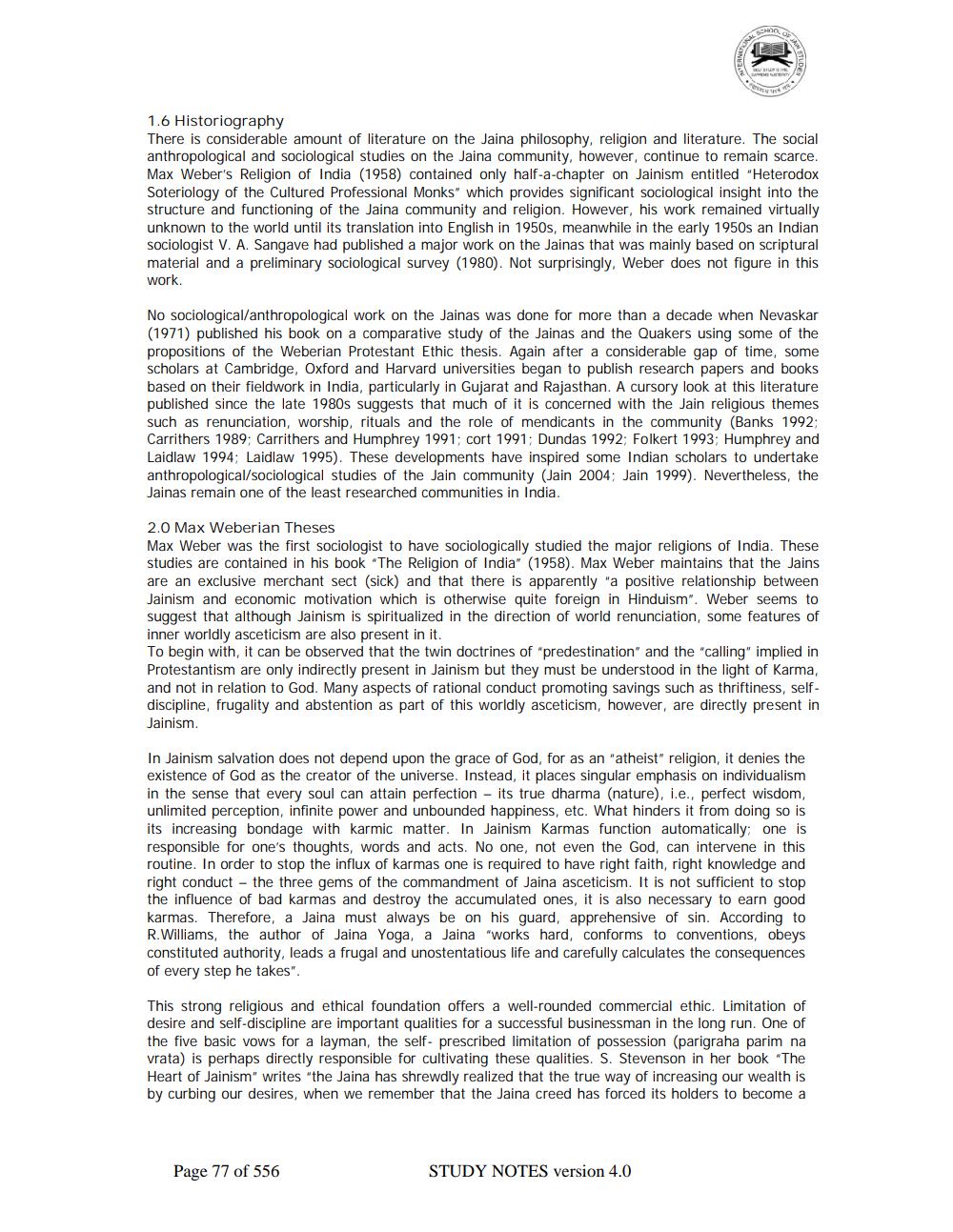________________
1.6 Historiography There is considerable amount of literature on the Jaina philosophy, religion and literature. The social anthropological and sociological studies on the Jaina community, however, continue to remain scarce Max Weber's Religion of India (1958) contained only half-a-chapter on Jainism entitled "Heterodox Soteriology of the Cultured Professional Monks" which provides significant sociological insight into the structure and functioning of the Jaina community and religion. However, his work remained virtually unknown to the world until its translation into English in 1950s, meanwhile in the early 1950s an Indian sociologist V. A. Sangave had published a major work on the Jainas that was mainly based on scriptural material and a preliminary sociological Survey (1980). Not surprisingly, Weber does not figure in this work.
No sociological/anthropological work on the Jainas was done for more than a decade when Nevaskar (1971) published his book on a comparative study of the Jainas and the Quakers using some of the propositions of the Weberian Protestant Ethic thesis. Again after a considerable gap of time, some scholars at Cambridge, Oxford and Harvard universities began to publish research papers and books based on their fieldwork in India, particularly in Gujarat and Rajasthan. A cursory look at this literature published since the late 1980s suggests that much of it is concerned with the Jain religious themes such as renunciation, worship, rituals and the role of mendicants in the community (Banks 1992; Carrithers 1989; Carrithers and Humphrey 1991; cort 1991: Dundas 1992; Folkert 1993; Humphrey and Laidlaw 1994; Laidlaw 1995). These developments have inspired some Indian scholars to undertake anthropological/sociological studies of the Jain community (Jain 2004; Jain 1999). Nevertheless, the Jainas remain one of the least researched communities in India.
2.0 Max Weberian Theses Max Weber was the first sociologist to have sociologically studied the major religions of India. These studies are contained in his book "The Religion of India" (1958). Max Weber maintains that the Jains are an exclusive merchant sect (sick) and that there is apparently "a positive relationship between Jainism and economic motivation which is otherwise quite foreign in Hinduism". Weber seems to suggest that although Jainism is spiritualized in the direction of world renunciation, some features of inner worldly asceticism are also present in it. To begin with, it can be observed that the twin doctrines of "predestination" and the "calling" implied in Protestantism are only indirectly present in Jainism but they must be understood in the light of Karma, and not in relation to God. Many aspects of rational conduct promoting savings such as thriftiness, selfdiscipline, frugality and abstention as part of this worldly asceticism, however, are directly present in Jainism.
In Jainism salvation does not depend upon the grace of God, for as an "atheist" religion, it denies the existence of God as the creator of the universe. Instead, it places singular emphasis on individualism in the sense that every soul can attain perfection - its true dharma (nature), i.e., perfect wisdom, unlimited perception, infinite power and unbounded happiness, etc. What hinders it from doing so is its increasing bondage with karmic matter. In Jainism Karmas function automatically; one is responsible for one's thoughts, words and acts. No one, not even the God, can intervene in this routine. In order to stop the influx of karmas one is required to have right faith, right knowledge and right conduct - the three gems of the commandment of Jaina asceticism. It is not sufficient to stop the influence of bad karmas and destroy the accumulated ones, it is also necessary to earn good karmas. Therefore, a Jaina must always be on his guard, apprehensive of sin. According to R. Williams, the author of Jaina Yoga, a Jaina "works hard, conforms to conventions, obeys constituted authority, leads a frugal and unostentatious life and carefully calculates the consequences of every step he takes".
This strong religious and ethical foundation offers a well-rounded commercial ethic. Limitation of desire and self-discipline are important qualities for a successful businessman in the long run. One of the five basic vows for a layman, the self- prescribed limitation of possession (parigraha parim na vrata) is perhaps directly responsible for cultivating these qualities. S. Stevenson in her book "The Heart of Jainism" writes "the Jaina has shrewdly realized that the true way of increasing our wealth is by curbing our desires, when we remember that the Jaina creed has forced its holders to become a
Page 77 of 556
STUDY NOTES version 4.0




